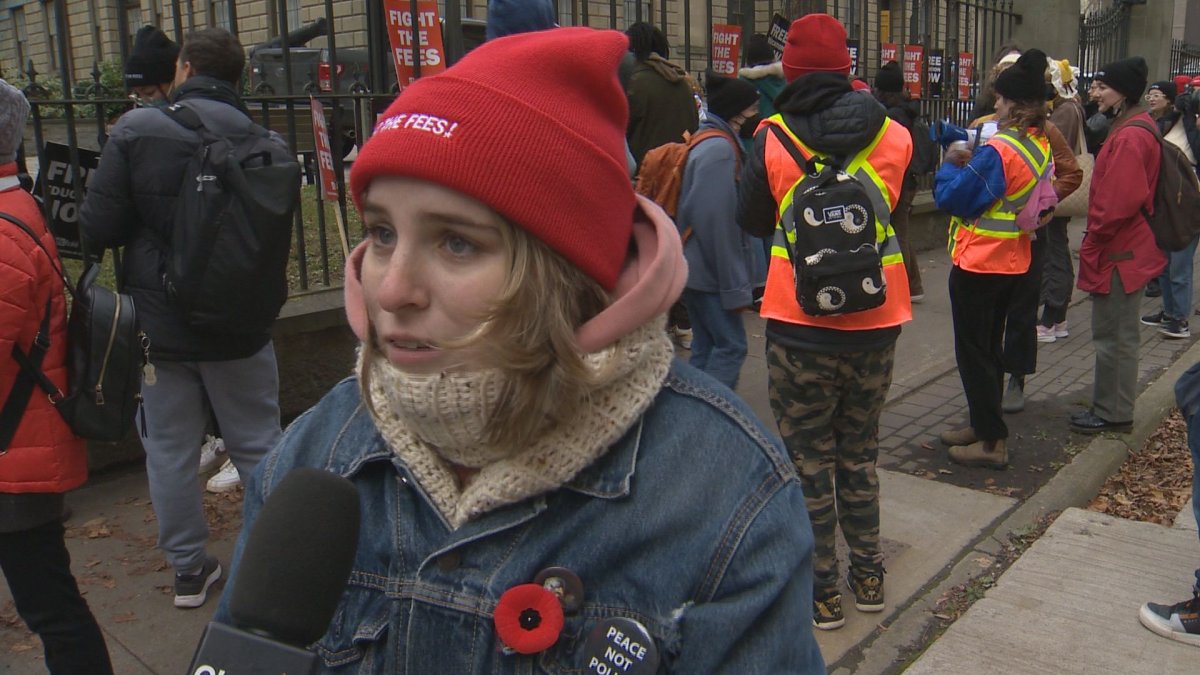Dozens of university students marched to Province House in Halifax on Wednesday afternoon to demand the provincial government strengthen its investments in post-secondary education.

The gathering was part of a larger movement taking place across the country — known as the “Day of action for free and universal access to university education”, which was organized by the Canadian Federation of Students (CFS), a student-led federation representing 530,000 students across Canada.
Julia Clarke, who’s been attending the University of King’s College since 2019, said she’s had to change her areas of study several times just to reduce costs.
“It’s become a little bit disheartening,” she said, adding that tuition fees have “skyrocketed” over the past four years and caused many of her peers to drop out of school.
“The day-to-day costs of groceries, rent, and power are unbearable, especially if you’re a student and you don’t have time to work full-time.”
According to a statement from the CFS, the rally was a part of a larger “Fight the Fees” campaign which holds the objective of encouraging individual levels of government to create strategies to “reduce and eliminate tuition fees, student loans and interest, and invest in public education.”
“As costs are increasingly downloaded onto students, the amount owed to the Canada Student Loans Program has reached over $19 billion and is increasing by nearly $1 million per day,” a release from the organization read.
“Today, a student who has to take out a loan will pay over $10,000 more for their education than someone who can afford these high upfront costs.”
Clarke, who said she believes education shouldn’t be deemed a “privilege, but a right,” said student life has become unaffordable in Halifax.
“If you want to be able to afford a rent you have to live with a minimum of four other people,” she said. “It’s difficult when you’re dealing with financial stress, mental health problems, full course loads, working multiple jobs.”
Some of the changes students were calling on included the elimination of tuition fees, funding to assist with rising living costs, and the conversion of all loans into non-repayable grants.
David Hudson, a former student who completed his post-secondary program about three years ago, said he’s still working to pay down about $20,000 in student loans for an education that he “hasn’t used in any of the jobs” that he’s had since graduating.
“The education I got was great and the information was awesome, but it’s not exactly been useful in terms of practicality. I’m still paying off these student loans, but not in a way that I’m able to use the education to help pay for it,” he said.
Hudson said it would be a “game-changer” if his outstanding loan balance was eliminated today.
“It’s just a huge amount of money that I could invest in myself, my community, or in projects or small business ideas I have but instead of having that money, I’m sending it to the government,” he said.
Henry Leitch, an 18-year-old student, said he thinks education should be “as accessible as possible” considering the expectations set by a vast number of employers that workers possess certain skills that are only obtained through receiving a college or university degree.
“You’re expected to have a lot of education if you want to get a job,” he said.
“For education to be so unaffordable for students who are living on their own … it costs an arm and a leg, and it makes it really hard to have a future.”
Following question period on Wednesday, Nova Scotia’s Minister of Advanced Education Brian Wong said the provincial government is continuing to search for ways to make post-secondary education affordable for students, but added that it’s important for students to do independent research before enrolling.
“One of the things I think is important is that when students come into a program, they understand what the requirements (are) of that program, the costs of whatever area they’re coming into and they have to look at a variety of ways to get the money that they need to be able to afford it,” he said, adding that there currently aren’t plans to cap tuition fees further.
“What I’m concerned about is that students are able to afford to get the education that they want. I think it’s incumbent on all of us, universities, government, and individuals, in order to really accomplish this.”
Despite the everyday challenges associated with being a full-time student, Clarke said seeing the number of people rallying on Wednesday offered her some hope that eventually some of these ideas surrounding the elimination of tuition fees and accessible grants could become a reality.
“Days like today … I feel the hope that a different future is possible and hopefully we won’t be having these ‘days of action’ in the future,” she said.
— with files from Zack Power





Comments